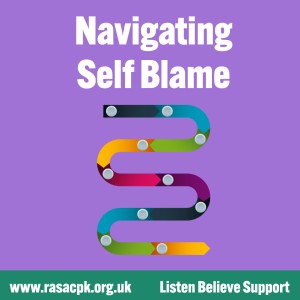RASAC Blogs
Navigating self-blame - a brief guide
 Navigating self-blame
Navigating self-blame
Many survivors of sexual violence blame themselves for what they have experienced at some point during their survivor journey. But why would we blame ourselves for the actions of others, and how can we combat this?
Four ways self-blame is trying to help us survive, and four things we can do about it:
-1. Self-blame can give us a sense of control.
Sexual violence is a traumatic experience. Survivors experience powerlessness, being under threat, not being able to choose. Self-blame can be one way our minds try to protect us after experiencing pain; if we can find things that we could do differently or if we can be different, then perhaps there is a way we can avoid pain in the future.
-Self-compassion can give us our power back.
A 2019 study by the Universities of Oxford and Exeter found that participants who were able to be kind to themselves not only reported feeling more self-compassion and connection with others, but also showed physical responses consistent with the body’s threat response being switched off, such as a lower heart rate.
Exercise: Try writing down three things you have done well at the end of each day, or three things that you appreciate about yourself. If this feels difficult, think about what someone who cares about you e.g. your best friend might say.
-2. Self-blame can help us to stay connected.
Perpetrators are often people a survivor has a strong emotional connection to, such as a partner, family member, or close friend. Self-blame can help us to avoid blaming others; it may feel easier to tell ourselves ‘I drove them to do that; it was my fault’ than to risk losing the emotional bond we have with someone who has hurt us.
-Attributing responsibility correctly can free us to act.
While it’s human to want to hold on to emotional connections, if we avoid accepting someone’s actions have harmed us that can lead us to feeling powerless and unhappy. Feeling responsible for the actions of others can be a heavy burden – accepting that something wasn’t our fault means accepting we couldn’t prevent it, but it also means we don’t have to carry that weight anymore.
-Exercise: Try drawing a line down a piece of paper. On one half, write down all the self-blaming thoughts you have about a situation. On the other half, try arguing the opposite and write down as many reasons as you can think of why it may not be your responsibility. What other explanations are there for what happened?
-3. Self-blame can help us avoid change.
Sexual violence often leaves survivors feeling unsafe. Change can be hard at any time, but if recognising harm we experienced was not our fault means changing our lives significantly, for example leaving a marriage, it may feel safer to blame ourselves.
-Embracing change can allow us to grow.
The idea of change can feel frightening, and many people go through times of feel stuck where they can’t see how to create changes they would like in their lives. However, change doesn’t have to be negative. Any major life event, from a birthday to a new job, is about change. When we feel anxiety about things being different, this is usually about how well we feel able to cope with change. To tackle this, start with identifying small possibilities for positive change that are within your control.
-Exercise: Try completing a self-care wheel exercise. What areas of your life could benefit from starting something new or trying something different?
-4. Self-blame can protect us from facing what happened.
The UK Trauma Council defines trauma as a “lasting emotional response that often results from living through a distressing event.” It can hard to accept that bad things have happened to us; it’s human to want to avoid pain and seek happiness. Accepting that we have been harmed can be really challenging, and blaming ourselves can be a way of avoiding feeling the full impact of a traumatic event.
-Self-acceptance can help us to find a way forward.
It can be hard to accept that we’ve been through a traumatic experience, but avoiding it is often not something we can maintain for very long. Practicing accepting ourselves as we are now can be a first step towards thinking about things from our past that we’d rather avoid. For some people, focusing inward can feel uncomfortable, but it is a skill that you can build over time.
-Exercise: Try taking some time to bring your awareness to your thoughts and emotions, noticing them without trying to change them or direct your mind in a particular direction. An guided audio or video meditation, like this noticing practice, can help with this.




